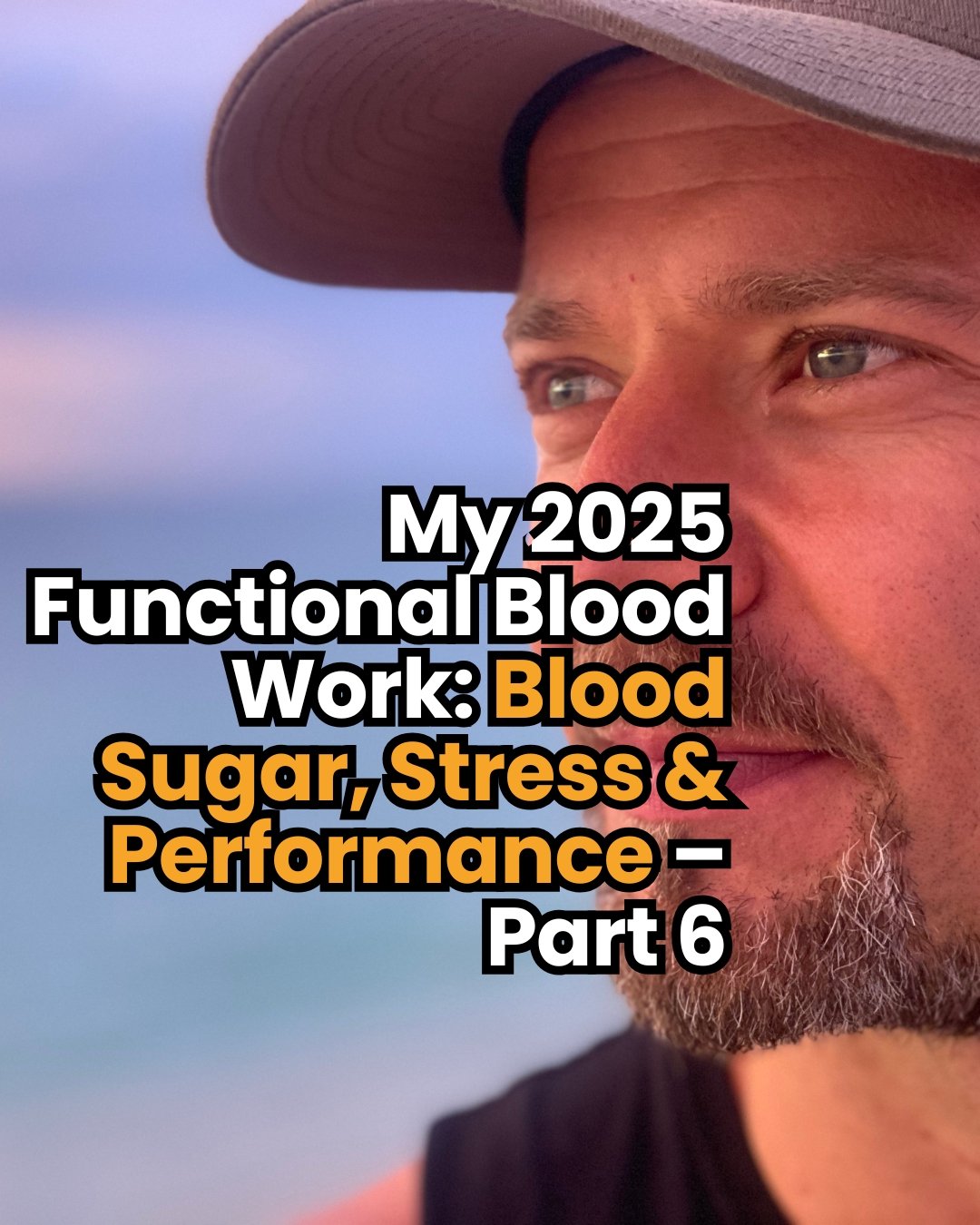
My 2025 Functional Blood Work: Blood Sugar, Stress & Performance – Part 6
In the first five parts of this series, I unpacked a lot.
From immune system stress and gut health to liver, kidney, and hormone function. This post might not sound as exciting as “testosterone” or “gallbladder,” but it’s just as important, maybe even more.
Why?
Because blood sugar regulation isn’t just about diabetes or fat loss. It’s about performance, recovery, energy, and brain clarity, especially in midlife.
And when I reviewed my latest blood markers, a few things jumped out that most GPs would skim over... but from a functional lens, they’re full of clues.

When Fitness Isn’t Enough: My Wake-Up Call and the Health Lesson Every Man Needs
In 2018, I walked away from the gym I had poured my heart and soul into. I left London. Sold my shares. Moved to Byron Bay (East Coast Australia), chasing sun, surf, and space to breathe.
From the outside, it looked like a bold life pivot. A clean break. A midlife upgrade.
But the truth?
I was exhausted. Burnt out. Strung out. And completely disconnected from my own health.

Keep stress at bay with mindful diaphragmatic breathing
Left unchecked, stress can lead to headaches, weight gain, muscle tension, high blood pressure, sleep problems, and low libido, just to name but a few consequences. When stress becomes chronic the physiological responses can become destructive. The body starts to produce too much adrenaline too frequently which can lead to adrenal fatigue, leaving us tired, anxious and irritable. High levels of stress can suppress immune function [7], accelerate cellular ageing [6], and promoting an earlier onset of age-related diseases.

Anxiety, Stress and Depression Relief in a Box
What do Yoga teachers, meditation leaders, mindfulness practitioners, Navy SEALs, firefighters, paramedics, and elite athletes all have in common? Take a moment to think about the relaxed state many of these different categories of people can be in. Even in high-stress situation spiders, firefighters and paramedics can keep their shit together and get the job done.

Why High Performers Can Have a High Histamine Type Personality
High performers who struggle with stress and anxiety, or even depression, are frequently perfectionists. They want things to be a certain way, and they have high expectations. Living up to these expectations can increase their stress and anxiety. They have what is referred to as a ‘high histamine type personality’.
There are some apparent traits or personality types observed in high histamine type personality:

A Tip to Lower Stress and Improve Productivity
One of our most popular blogs to date has been The Human Stress Response - Homeostasis. Recently we asked our Team Sustain clients what aspects of Sustainable Health are important to them, and how can TSTMethod offer more? One common thread that seems to appear in the feedback is stress management. Stress management is important because no matter what diet you follow, how much you exercise and what supplements you take, if you’re not managing your stress you will struggle to make progress in the gym and be at risk for modern degenerative conditions like heart disease, diabetes, hypothyroidism and autoimmunity

Nonviolent Communication for a Stressful Situation
Stress is becoming more of a concern in our modern lifestyle. Many of us work in a stressful environment and find ourselves vulnerable to sleep disorders, feeling overworked, anxiety, frustration, and even depression, just to name a few. Can we change our perception of stress and turn a negative emotion into a more positive experience?

Deep Breathing: De-Stressing the Mind & Body
For many, de-stressing means coming home, switching on the TV, putting your feet up and “zoning out” with what many believe is a mental distraction. While this may seem like a good ideal or a relaxing way to end your day is it an effective way of reducing the damaging effects of stress? The short answer is no.

4-7-8 Breathing Recovery for Athletic Performance
The science of breathing stands on quite ancient foundations. Centuries of wisdom instructs us to pay closer attention to our breathing, the most basic of things we do each day. The first functional movement you perform when you come out of your mother's womb… breath. And yet, maybe because breathing is so basic, it’s also easy to ignore. A growing number of studies have revealed that diaphragmatic breathing may trigger body relaxation responses and benefit both physical and mental health.
Breathing exercises, or the focus on slow regular and sometimes deep breathing, are helpful to manage stress and improve health. In this blog, we are going to talk about the 4-7-8 breathing method (also known as the Relaxing Breath) and why it is a great way to end a training session. The principles of 4-7-8 breathing come from ancient yogic breathing techniques known as Pranayama. Yoga breathing has been scientifically shown decrease stress, lower heart rate and blood pressure [5], improve immunity, and help us sleep.

The Human Stress Response - Homeostasis
We continually placing our bodies under high levels of stress (sympathetic nervous system) - just about everything we do in our daily lives has an impact on our energy equation and our metabolism. Just sitting at your desk and thinking can use over 700calories, the brain requires a lot of energy to think. Physical activity is a hugely energy intensive stressors as the muscles, and the brain is needed to coordinate movement and meet the demands of the training session/competition.
When we eat poorly (cut calories, don’t eat enough quality nutrient-dense foods), we affect our metabolism and force our body to tap into other energy stores (lean muscle mass breakdown, fat metabolism, down-regulation of certain hormones (like you reproductive hormones)) to maintain energy balance in the body. Poor quality sleep also impacts our brain function and performance.
